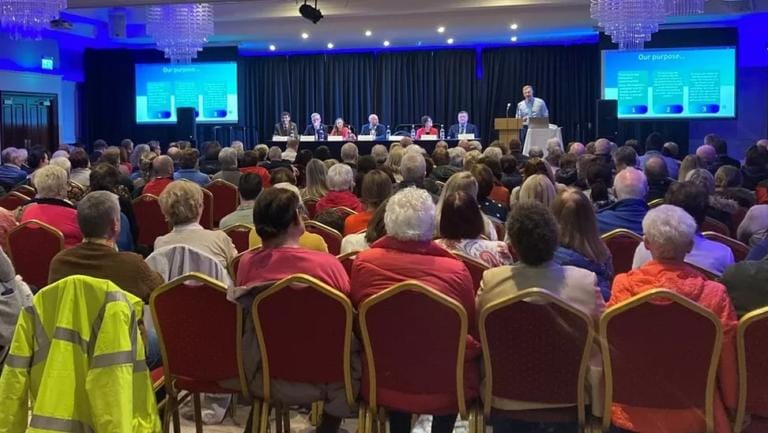Newry’s Daisy Hill hospital serves the entire Northern border community and beyond, with a catchment area from Cullaville in South Armagh over to Annalong in South Down. As is typical for the infrastructure in this community, it’s suffered from decades of sectarian neglect and peripheralisation from disinterested, if not hostile, Stormont and Westminster governments. This is despite being located in what is acknowledged as a “hinterland” on the eastern coast of Ireland.
Further degradations in service were announced by the Southern Trust, without consultation with the local community which will suffer. The effort of local groups such as the local “Save Our Emergency Services” shamed the Trust into holding a public consultation with a panel of clinicians and bureaucrats defending the Trust’s position to a crowd of 4-500 angry local people.
As one recommendation stemming from the contentious “Bengoa Report”, Emergency General Surgery has been formally moved to Craigavon which is a 40 minute drive away. A ‘temporary’ withdrawal had been announced in January 2022, and despite worries from the community and reassurances from the Trust this was indeed temporary, now the Trust moves forward with cuts in service by stealth as feared.
This mere 40 minute drive was no solace to audience member Niamh McArdle who required emergency general surgery in May 2022 after a botched caesarian section which rendered her seriously ill. She was instructed to lay-still in an ambulance as she was taken up the windy road to Craigavon. The junior doctor herself accompanying Niamh stopped twice in the journey to vomit as a result of travel sickness. Niamh went on to describe how the Trust omitted to include Niamh’s horrific experience from their supplied statistics justifying the move as not harming patient care. One harrowing story amongst many given which publicised consequences of service degradations inconvenient to the Trust.
These service changes were described by the panel as if they were brought on by a force of nature, the result of an opaque and impossible to understand bureaucratic process. One panellist made reference to the “elephant in the room” of staffing shortages, whilst this, of course, is an important factor it must be acknowledged the true “elephant in the room” causing that issue and many others which went unacknowledged – the callous neoliberal economic model which starves and hurts communities by design.
The audience were not mollified by the justifications made by the panel. Disgruntled on-lookers vocally intervened in the “Death-by-Powerpoint” an hour into the scheduled 2 hours and 30-minute meeting to force an actual consultation with the community where they could speak up for themselves. Some were medical workers themselves, or had sought the opinion of concerned staff and so poked holes in the Trust’s narrative. Even an ambulance worker sympathetic to the panel admitted that the local ambulance service is essentially on its last legs, with only 2 ambulances on call in Newry, desperate for further investment.
The Trust’s chief executive Maria O’Kane made a bizarre statement blaming difficulties the hospital faced (in part) on patients over-staying their welcome. One audience member later corrected this by pointing out there is a lack of long-term care plans, support staff etc. to facilitate patients leaving promptly, leading into another patient’s tale of how her elderly cancer-stricken , covid-infected mother was secretly dumped out of the hospital to her care-home where the staff begged to have the patient returned to hospital care considering her awful condition.
A recurrent fear (if not prediction) was that the interlocking nature of many departments was that permanently losing emergency general surgery would give further impetus to a steady exodus of services across the board and cause Daisy Hill’s emergency department to be downgraded.
Annalong and Crossmaglen are 1 hour out from Craigavon, almost twice the time it would take to reach Newry. These isolated rural communities facing journeys on poor quality, windy roads find little comfort in the assurance they’ll enjoy greater service levels concentrated in a distant hospital. On a positive note, there was a strong Union presence at the meeting with representatives from NIPSA, Unison and more. They put into view the general sorry state of the medical service and gave clear cutting rebukes to many of the statistics and rhetoric used to justify services changes, embarrassing the panel who were sheepishly passing the microphone around to whoever was willing to craft the next excuse. Increasing class antagonisms are unsurprisingly giving a boost to working class organisations and public support for them, as evidenced by rounds of thunderous applause.
Strikes and pickets have become increasingly common-place at Daisy Hill, as across the Northern health service and general society in recent months. Unions need support in forcing the health service to take heed of working-class concerns. The health service has been on a steady decline for years, not one that can simply be blamed on the DUP’s absence from Stormont, which is set to be a long-term development. A genuine working class movement is the only force which can resist further degradations, whether that be at the hands of distant Tories or local supposedly-progressive parties.
